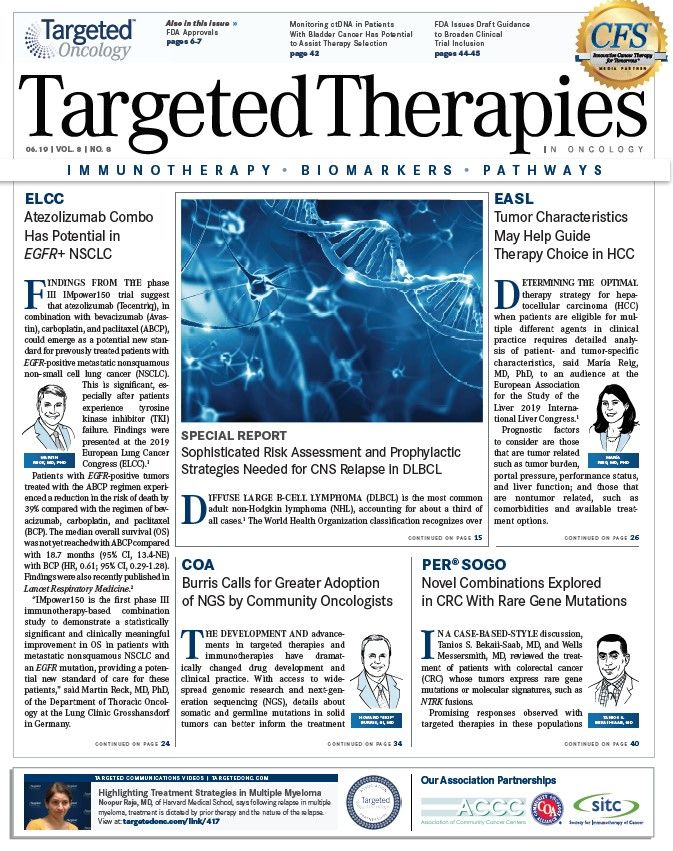Novel Combinations Explored in CRC With Rare Gene Mutations
In a case-based-style discussion, Tanios S. Bekaii-Saab, MD, and Wells Messersmith, MD, reviewed the treatment of patients with colorectal cancer whose tumors express rare gene mutations or molecular signatures, such as <em>NTRK</em> fusions.
Tanios S. Bekaii-Saab, MD

Tanios S. Bekaii-Saab, MD
In a case-based-style discussion, Tanios S. Bekaii-Saab, MD, and Wells Messersmith, MD, reviewed the treatment of patients with colorectal cancer (CRC) whose tumors express rare gene mutations or molecular signatures.
Promising responses observed with targeted therapies in these populations warrant the use of next-generation sequencing to determine who will benefit from precision treatment. The 2 experts led their discussion at the4th AnnualSchool of Gastrointestinal Oncology™, hosted by Physicians’ Education Resource®, LLC, in Washington, DC.1
TargetingNTRKFusions
“[NTRK fusion] is an incredibly rare target, but it is a relevant target,” said Bekaii-Saab of the Mayo Clinic. “The NCCN [National Comprehensive Cancer Network] guidelines2have included a footnote stating that larotrectinib [Vitrakvi] would be an acceptable option for patients [with NTRK fusion-positive metastatic CRC] who have progressed on first- and second-line therapy.”
The approval of larotrectinib was based on data from 3 trials that were published in the New England Journal of Medicine last year.3Of the 55 patients enrolled in the overall cohort, 4 had CRC. The primary endpoint of overall response rate showed that 75% of patients in the study experienced a partial response or better.
“That is looking at all of the tumors combined,” BekaiiSaab said. “For colon cancer, the actual response is about 30% to 40%.”
Due to the rarity of this mutation, Bekaii-Saab warned that clinicians must consistently test patients to find the small subset who may benefit from TRK inhibitors.
Poor Prognosis WithBRAFV600E
In CRC, BRAF mutations occur at a rate of 8% to 15%, and the predominant mutation is a single-base substitution of valine by glutamic acid at position 600 (V600E) within the activation segment.
“There’s an association with right-sided [cancers], female patients, older age, and MSI [microsatellite instability]high status, which is an epigenetic mechanism,” said Messersmith of the University of Colorado School of Medicine.
Messersmith reminded the audience that BRAF mutations have historically been associated with poor prognosis. In the phase III CRYSTAL trial, patients with BRAF wild-type (WT) status had better rates of overall survival compared with those who had BRAF-mutant tumors, regardless of the therapy regimen.4
When targeted therapies were first used to target this mutation, it became clear that single-agent BRAF inhibitors were not enough to induce a tumor response. “The problem with BRAF is that when you inhibit it, you get overexpression of CRAF and ARAF, and you also have downstream expression of signaling molecules that increase EGFR activation,” he said. This leads to adaptive feedback reactivation of MAPK signaling that is often mediated by EGFR.5 “Unfortunately, it is very difficult to try [to] block this [MEK/ERK] pathway, so just using 1 drug is not going to work,” he said.
Combination therapies that simultaneously target EGFR may be key to the success of BRAF inhibition, Messersmith said. Adding the BRAF kinase inhibitor vemurafenib (Zelboraf) to treatment with the EGFR inhibitor cetuximab (Erbitux) and irinotecan more than doubled progression-free survival in patients with BRAF V600E mutations and extended RAS WT advanced disease compared with those who received the cetuximab and irinotecan alone (4.4 vs 2 months, respectively) in the phase II SWOG 1406 trial (HR, 0.42).6
Another strategy for BRAF-mutant tumors is MEK and BRAF inhibitor combinations; this is being tested in the BEACON CRC trial. This 3-arm trial is testing the combination of encorafenib (Braftovi), binimetinib (Mektovi), and cetuximab. The 2 comparator arms are testing encorafenib or FOLFIRI (folinic acid, fluorouracil, and irinotecan), both in combination with cetuximab.7Updated results of the phase III trial showed 26.1% response rate, and these results are slated for submission to the FDA for market approval of the combination in the second half of 2019.
He discussed other anti-BRAF/MEK combinations, such as dabrafenib (Tafinlar) and trametinib (Mekinist), a promising combination that had a modest response rate (21%) when used in combination with the EGFR inhibitor panitumumab (Vectibix).5Both combinations have been added to the updated NCCN guidelines for second-line and subsequent treatment of CRC.2“Most of these [regimens] are not tested in non-V600E mutations,” Messersmith said.
Wells Messersmith, MD

Wells Messersmith, MD
Microsatellite-Unstable Tumors
Messersmith reviewed the relationship between mismatch repair (MMR) proteins, which repair basebase mismatches that occur during DNA replication and recombination, and microsatellites, which are short, repeated DNA sequences that are highly prone to such mutations. Correctly functioning MMR systems tend to target and repair microsatellite alterations. MSI is the result of impaired, or deficient, MMR.
MSI-high tumors can have either acquired or germline origins. In Lynch syndrome, germline mutations in 1 of the mismatch repair genesMLH1,MLH2,MSH6,PMS2, orEPCAMwill increase the patient’s lifetime risk of certain carcinomas, including CRC. For acquired MSI, hypermethylation of theMLH1promoter and epigenetic silencing ofMLH1may cause the aberration within the tumor.
Patients in the MSI-high subgroup have shown positive responses to antiPD-1 therapy with nivolumab (Opdivo) and ipilimumab (Yervoy), a trend observed regardless of PD-L1 expression,BRAF/KRASmutational status, or clinical history of Lynch syndrome.8
“The key issue with immunotherapy is that…many clinicians have patients on these agents for years,” Messersmith concluded. “Now the question is: When can we take them off? When is it safe?”TT
References
- Bekaii-Saab T, Messersmith W. Handling rare molecular subtypes in GI malignancies. Presented at: 4th Annual School of Gastrointestinal Oncology™; April 27, 2019; Washington, DC.
- NCCN Clinical Practice Guidelines in Oncology. Colon Cancer, version 2.2019. National Comprehensive Cancer Network website. bit.ly/2mCS0rT. Published May 15, 2019. Accessed May 16, 2019.
- Drilon A, Laetsch TW, Kummar S, et al. Efficacy of larotrectinib in TRK fusion-positive cancers in adults and children.N Engl J Med. 2018;378(8):731-739. doi: 10.1056/NEJMoa1714448.
- Van Cutsem E, Kohne C-H, Lang I, et al. Cetuximab plus irinotecan, fluorouracil, and leucovorin as first-line treatment for metastatic colorectal cancer: updated analysis of overall survival according to tumor KRAS and BRAF mutations status.J Clin Oncol. 2011;29(15):2011-2019. doi: 10.1200/JCO.2010.33.5091.
- Corcoran RB, Andre T, Atreya CE, et al. Combined BRAF, EGFR, and MEK inhibition in patients with BRAFV600E-mutant colorectal cancer.Cancer Discov. 2018;8(4):428-443. doi: 10.1158/2159-8290.CD-17-1226.
- Kopetz S, McDonough SL, Morris VK, et al. Randomized trial of irinotecan and cetuximab with or without vemurafenib in BRAF-mutant metastatic colorectal cancer (SWOG 1406). J Clin Oncol. 2017;35(suppl 4; abstr 520). doi: 10.1200/JCO.2017.35.4_suppl.520.
- Array Biopharma announces Braftovi + Mektovi + Cetuximab meet primary endpoints of ORR and OS in phase 3 BEACON CRC trial interim analysis for the treatment of BRAF(V600E)-mutant metastatic colorectal cancer [news release]. Boulder, CO; Array BioPharma, Inc.; May 21, 2019. bit.ly/2F1rkt7. Accessed June 7, 2019.
- Andre T, Lonardi S, Wong M, et al. Nivolumab + ipilimumab combination in patients with DNA mismatch repair-deficient/microsatellite instability-high (dMMR/MSI-H) metastatic colorectal cancer (mCRC): first report of the full cohort from CheckMate-142.J Clin Oncol. 2018;36(suppl 4; abstr 553). doi: 10.1200/JCO.2018.36.4_suppl.553.

Powell Reviews Updated IO/TKI Data and AE Management in Endometrial Cancer
April 18th 2024During a Case-Based Roundtable® event, Matthew A. Powell, MD, discussed the case of a patient with advanced endometrial cancer treated with lenvatinib plus pembrolizumab who experienced grade 2 treatment-related hypertension.
Read More